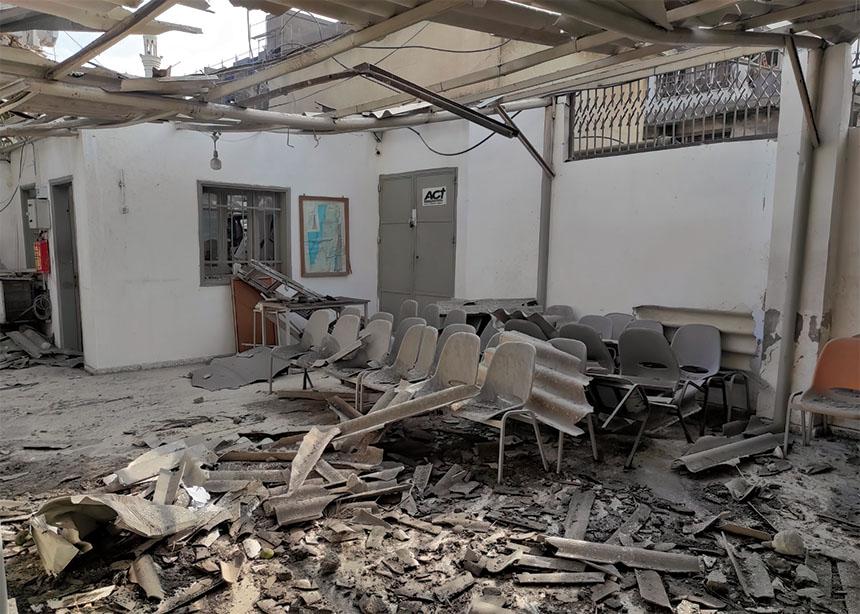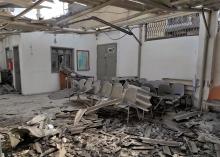As we prepare to send this peace-themed issue of the magazine to press, all eyes are on Gaza. Israeli tanks sit poised at its northern border, ready to invade. Long lines of transport trucks laden with aid sit at its southern border, as a humanitarian catastrophe unfolds. The people of Gaza, mostly civilians, sit in between—cut off, trapped, at the mercy of outside forces.
Though the situation may have changed by the time you read this, we hope you find relevance in the Palestinian voices we have assembled (pages 16, back cover), as well as in the other material related to Gaza (pages 4, 10, 12) and to peace more generally (pages 7, 18-21).
For context, we note the decades-old asymmetry of the situation in and around Gaza. While Palestinian groups, such as Hamas, have visited violence, fear and terror on Israelis over the years, in nearly every material and political way, Israel holds a staggering power advantage.
The fact that the Israeli government has perpetrated oppression, humiliation and disproportionate violence toward Palestinians for generations provides context to understand why Hamas fighters were enraged, but in no way does it justify or excuse what they did.
Nor does what they did justify or excuse the Israeli response.
The role of the West, including Canada, in allowing the volatile asymmetry to persist and worsen must be named and scrutinized.
Amid this asymmetry, we give preference to the voices of peace-minded Palestinian in this issue of Canadian Mennonite. We give preference to people on the side that does not get billions of dollars or world-class weapons from the West; the side whose leader is not embraced, literally and figuratively, by the so-called leader of the free world; the side that will never see Western landmarks lit up in the colours of their flag to show solidarity with them; the side that does not have at its unofficial disposal advocacy organizations that may critique us forcefully if we do not take their side (see below).
Part of the intentional preference in our reporting is due to the relationships that Mennonites have developed over many years in the region. In my observation, those relationships are largely, though certainly not exclusively, with Palestinians working for peace—people who speak fondly of their Jewish friends and seek to cross the lines that divide.
Some readers will disagree with our approach. If all this sounds too tilted to one side (especially coming from someone who likes to talk about nuance and complexity), see my 2017 interview with a representative of the Centre for Israel and Jewish Affairs, an organization that had “condemn[ed]” Mennonite Church Canada, saying that a resolution the church passed in relation to Israel spoke to “the moral blindness and increasing marginalization of a denomination in decline.”
These days, I find myself dissecting every headline I read about the Middle East, trying to decipher bias. It’s exhausting. Even prayers are often loaded with political bias. The exception, perhaps, is the most basic prayer: “Lord, have mercy.”
Indeed, may God have mercy on the hostages and the hostage-takers, the bereaved and those whose hands are stained with blood, those trapped inside borders and those trapped in the soul-consuming need for revenge, those who fear and those who console, those who hunger for food and those who thirst for peace.
Lord, have mercy.
Also in this issue . . .
A.S. Compton tells a story that explores the humanity of a soldier, the tension in a family and the judgement of a pacifist church.
Cathrin van Sintern-Dick explains how intercultural mediation can help address and prevent family conflicts that come with the complications of aging, care homes, inheritance and the like.
Madalene Arias, our Spanish-speaking correspondent, reports on how Ecuadorian Mennonites are addressing the deteriorating state of the society they live in.
James Barber talks about the white Christian nationalism lurking at our border.
In a book excerpt, Sarah Augustine and Sheri Hostetler argue that green technology is just another form of exploitative over-consumption, and that Jesus shows us how to deal with the temptations found in the wilderness of excess.
Finally, a reminder of CM’s online event discussing medical assistance in dying. For those who receive this in time, join us on October 25 at 8:00 p.m. EST. See canadianmennonite.org/events.





Add new comment
Canadian Mennonite invites comments and encourages constructive discussion about our content. Actual full names (first and last) are required. Comments are moderated and may be edited. They will not appear online until approved and will be posted during business hours. Some comments may be reproduced in print.